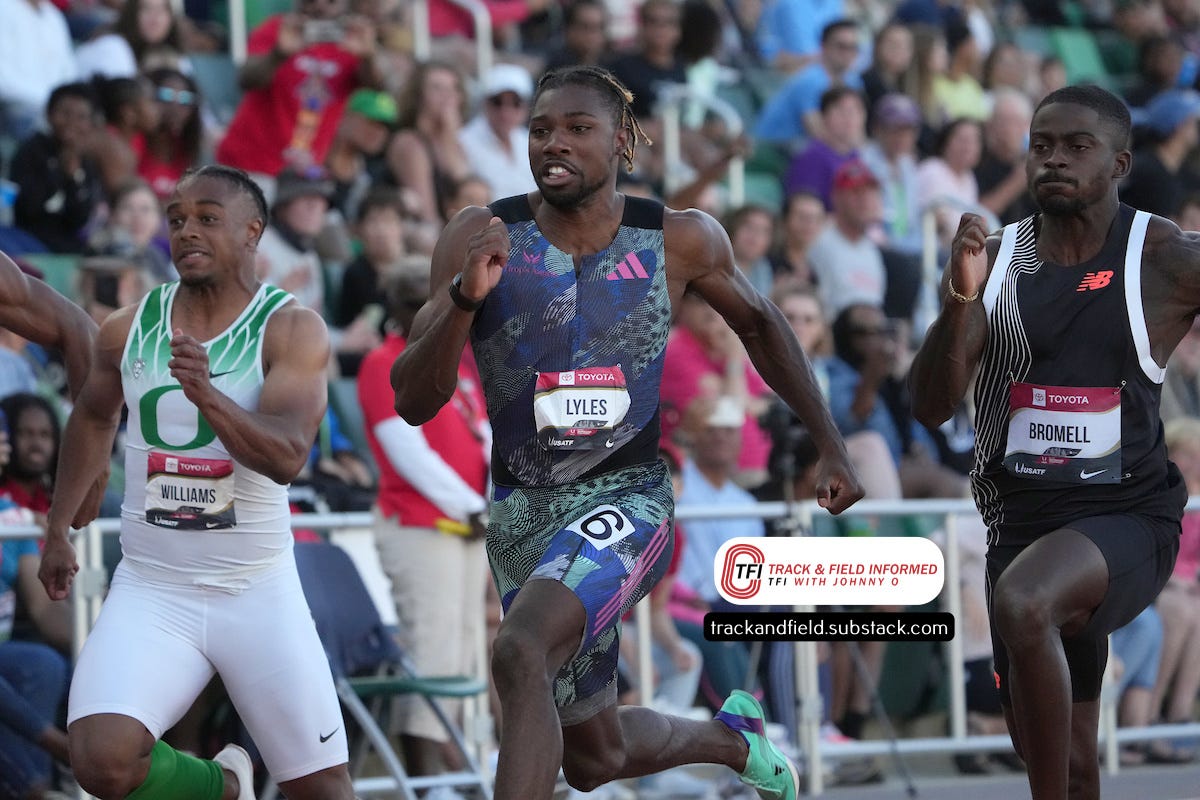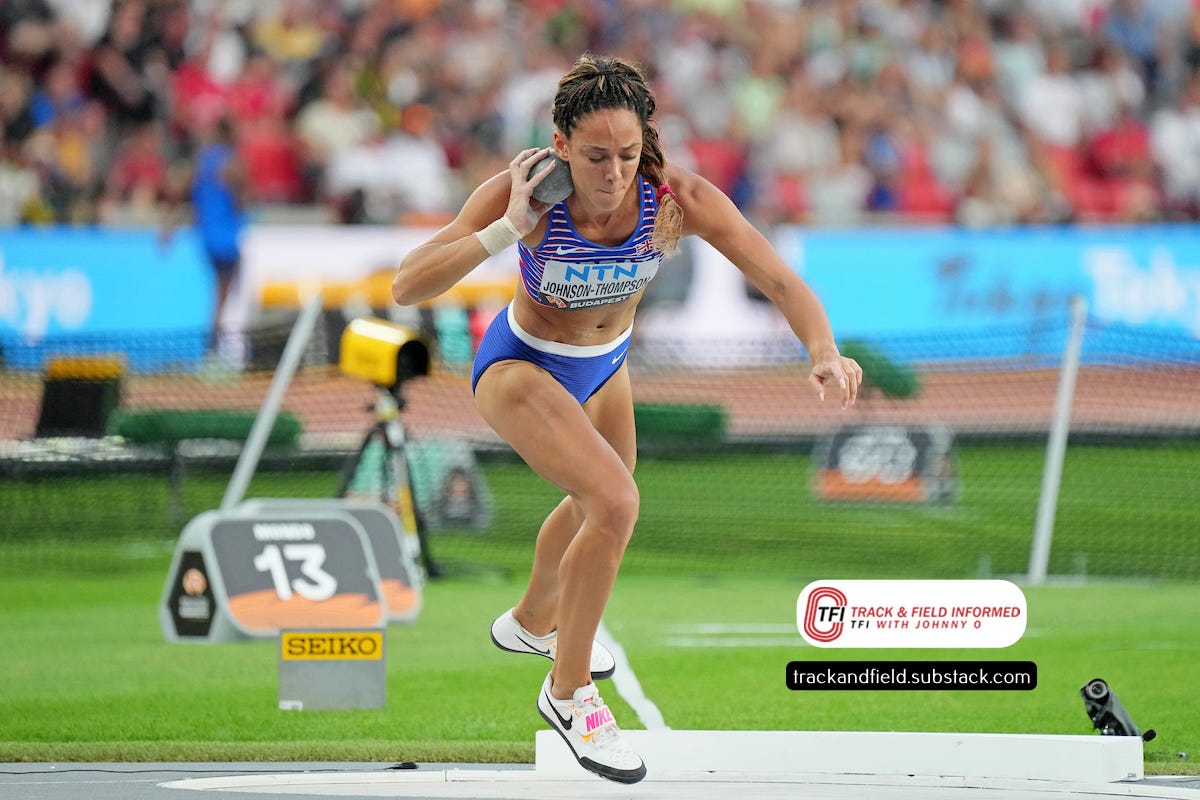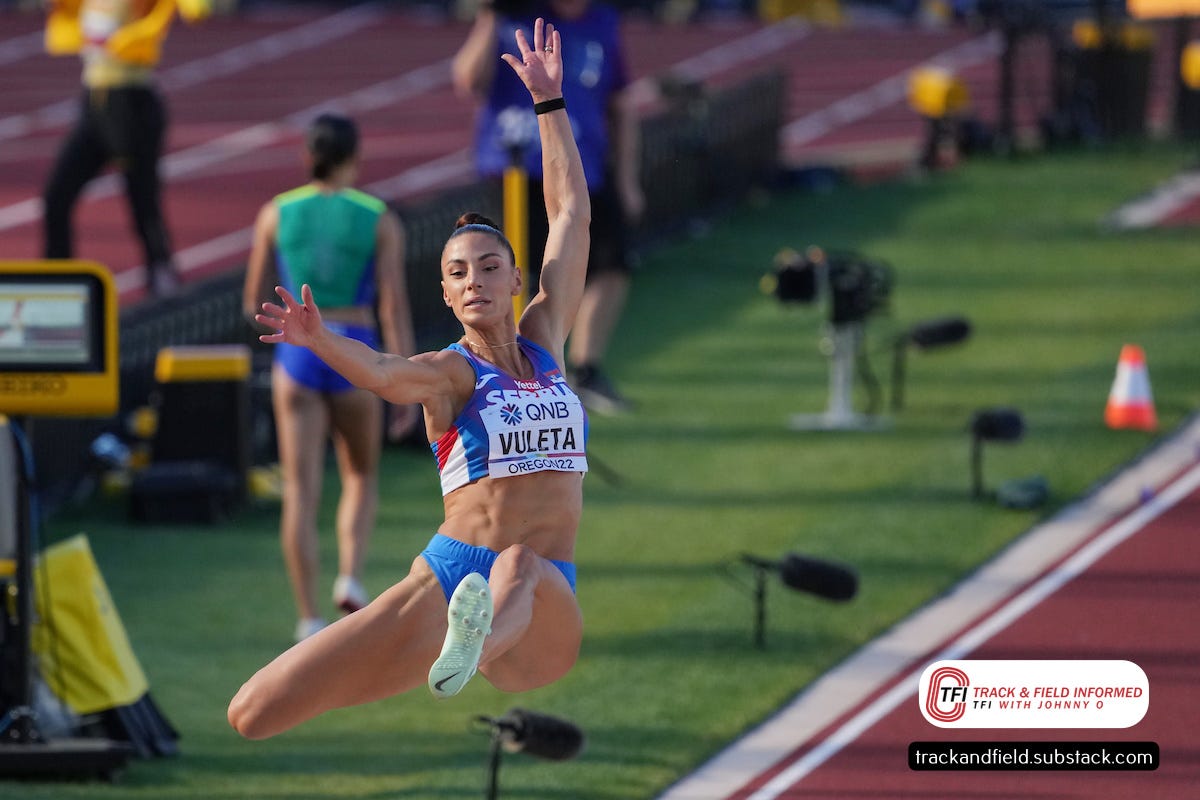Good start leads to great finish for Lyles
Sprinter wins men's 100 meters in World Champs after getting out of blocks well

For the folks out there who want to get technical — and I have seen the online comments from some of them — Noah Lyles of the U.S. fell short in the final of the men’s 100 meters in the World Athletics Championships in Budapest, Hungary on Sunday.
But in the area that matters most, winning a gold medal, his performance was a roaring success as he clocked a personal best of 9.83 while winning a race in which Letsile Tebogo of Botswana finished second in a national record of 9.88, Zharnel Hughes of Great Britain placed third in 9.88, Oblique Seville of Jamaica was fourth in 9.88, and Christian Coleman of the U.S. finished fifth in 9.92.
Defending champion Fred Kerley of the U.S. did not advance to the final as he finished third in 10.02 in his semifinal that took place about two and a half hours before the final. Olympic champion Marcell Jacobs was also eliminated when he placed third in 10.05 in another semifinal.
In addition, Akani Simbine of South Africa, who had placed fourth or fifth in the previous three World Championships and the last two Olympic Games, was disqualified from his semifinal for a false start.
The out-going Lyles had rattled the cages of some track and field fans when he recently stated on social media that he was going to run 9.65 in the 100 and 19.10 in 200 in the World Championships. Hence the online comments from naysayers about him falling short.
Kerley, for one, expressed annoyance with the 26-year-old Lyles, stating in a Friday press conference that if Lyles ran 9.65, he would run faster.
I have to admit that Lyles was not my pick to win the 100 before the meet began because he doesn’t always start well. But he looked good in winning a first-round heat in 9.95 on Saturday and he looked even better when he ran 9.87 to win the first of three semifinals on Sunday.
Coleman, the 2019 World champion and the silver medalist in 2017, won the second semifinal in 9.88 and Oblique Seville of Jamaica, who placed fourth last year, took the third in 9.90 while finishing ahead of Tebogo (9.98) and Kerley.
The typically fast-starting Coleman led the field out of the blocks in the final, but he stumbled ever so slightly about four or five steps into the race and went from first place to fifth in the final 30 meters of the race.
Lyles got off to a good start, just as he had in his semifinal, and he began to make up ground on everyone midway through the race. Coleman was still leading at that point, but he had begun to surrender real estate.
Lyles might not have taken the lead until the final 15 meters of the race, but it was clear he had won when he crossed the finish line.
“After the semi round, I knew that if I got the same start, it’d be over,” Lyles told NBC Sport’s Lewis Johnson. “As my coach said as soon as I got back… you don’t need to do anything different. I don’t care where you are in the race. You just do what you did in that semifinal. And I was like, All right. I don’t need to do anything extra.”
Lyles’ victory marked the fourth consecutive time that an American had won the men’s 100 in the World Championships as Justin Gatlin and Coleman went 1-2 ahead of Jamaican great Usain Bolt in the 2017 meet in London, Coleman won in 2019 in Doha, Qatar, and Kerley led a 1-2-3 U.S. finish in the meet in Eugene, Oregon last year.
With the victory in the 100 secured, Lyles turned his attention to the 200, the event in which he is the two-time defending champion and the owner of the U.S. record at 19.31. Johnson then brought up Lyles’ expressed desire to be one of the sport’s all-time greats and the 26-year-old did not shy away from the topic.
“To be one of the legends, you have to win the 100,” he said. “And then you got to win the 200, and then you got to win the… four by one… I’m feeling real good about 200.”
Lyles trimmed a hundredth of a second off of Michael Johnson’s American record of 19.32 in the World Championships last year. And while I’m not one to make guarantees, he would appear to have a chance of challenging Bolt’s world record of 19.19 if the conditions are right for the final that will be run on Friday.
The men’s 100 was one of six events on Sunday in which medals were awarded.
The others were the men’s 10,000 meters and hammer throw, and the women’s long jump, 20-kilometer walk, and heptathlon.
The women’s heptathlon was quite compelling as Katarina Johnson-Thompson of Great Britain came from behind to defeat Anna Hall of U.S. for the gold medal.
The 22-year-old Hall had entered the meet as the favorite after totaling 6,988 points in winning the heptathlon in the Hypomeeting in Gotzis, Austria in late May, and scoring 6,677 points to place first in the USA Track & Field Outdoor Championships in early July.
The 30-year-old Johnson-Thompson had totaled a national record of 6,981 to win the 2019 World Championships in Doha, Qatar, but she suffered a ruptured Achilles’ tendon several months before the Olympic Games in 2021 and finished second behind Hall in Gotzis with a score of 6,556.
Hall ended the first day of competition on Saturday with a 3,998 to 3,905 lead over second-place Johnson-Thompson. But the Brit took a 19-point lead over Hall in the standings after she leaped 6.54 meters (21 feet 5½ inches) to Hall’s 6.19 (20-3¾) in the long jump, the first event on Sunday.
Hall threw a season best of 44.88 (147-3) in the javelin, but Johnson-Thompson threw a personal best of 46.14 (151-4) to increase her lead over Hall to 43 points entering the 800 meters, the final event of the heptathlon.
Anouk Vetter of the Netherlands, thanks to a 59.57 (195-5) throw in the javelin, had moved past Hall into the second place at that point, but Hall is a much better 800 runner than Vetter so it was clear that she would finish ahead of her Dutch rival if nothing unusual occurred in that event.

The question was could Hall finish far enough ahead of Johnson-Thompson to make up 43 or more points on her and the answer turned out to be no.
Hall had the fastest time of anyone in the field with her time of 2 minutes 4.09 seconds. But Johnson-Thompson ran a personal best of 2:05.63 to only give up 23 points in the event and win the gold medal with a 6,740 to 6,720 victory over Hall.
Vetter ran 2:20.49 in the 800 and placed third in the standings with 6,501 points.
"I just knew I could prove to myself and prove to all the people that I could still do it," Johnson-Thompson was quoted as saying in a Reuters post. "This is the culmination of so much hard work. I'm so happy I'm crying. I can't help it. Today I know if I believed in myself I could do it.
"I haven't run those sort of times for four years but the last lap was amazing. I can't take it in, it's making me emotional."
Ivana Vuleta of Serbia was another event winner who was very emotional after her victory in the women’s long jump.
Vuleta had won the World Athletics Indoor Championships in 2018 and ’22, but her highest finish in global title meets held outdoors were bronze medals in the 2013 and ’15 World Championships, and in the 2016 Olympic Games in Rio de Janeiro. However, she had the two best jumps of the competition in Budapest, and her third-best effort was equal to the top mark of silver medalist Tara Davis-Woodhall of the U.S.
After fouling on her first attempt, the 33-year-old Vuleta took the lead when she spanned 7.05 (23-1¾) on her second. She then fouled on her third attempt and jumped 6.91 (22-8) on her fourth before getting off a 7.14 (23-5¼) jump on her fifth attempt that topped the national outdoor record of 7.10 (23-3½) that she had set in 2016.
Davis-Woodhall finished second at 6.91, followed by Alina Rotaru-Kottman of Romania, who jumped 6.88 (22-7).
"It has been a long, long, long ride," Vuleta said in a Reuters post. "Every medal, every final is really special but at this age it is really hard to keep everything together.
She then added, "I knew I was ready and I will deliver in the right moment. Finally, I did something I was dreaming of for so long. I am so emotional, this medal is really heavy. I enjoyed every single moment in this competition. After so many years and so many medals, I just knew I had to have one gold from an outdoor championships.”
While Vuleta won her first gold medal in the women’s outdoor World Championships on Sunday, Joshua Cheptegei of Uganda won his third consecutive title in the men’s 10,000 meters by unleashing a stinging kick on the last lap.
With temperatures in the low 90s (35 Celsius) at the start of the race, it figured that the first half of the race was not going to be particularly fast and Berihu Aregawi of Ethiopia led the field through the first 5,000 meters in 14:21.75.
Aregawi or countryman and Olympic champion Selemon Barega led the race for much of the next four kilometers, but the pace did not pick up appreciably until two laps to go. And then, with about 450 meters left, Cheptegei surged into the lead and never trailed again.
Barega, who surprised many by outkicking Cheptegei to win the gold medal in the Olympics, was closest to Cheptegei as they entered the home straightaway for the final time, but Cheptegei sped away from him to cross the finish line in 27:51.42. Barega appeared to have the silver medal wrapped up with 40 meters left in the race, but he slowed down enough over the last 20 meters to be passed by Kenyan Daniel Simiu Ebenyo, who ran 27:52.60 to Barega’s 27:52.72. Aregawi placed fourth in 27:55.71.
The 26-year-old Cheptegei ran the final 400 meters in 53.45 after clocking 53.39 over the final lap in his victory in Eugene, Oregon last year.
The results of the men’s hammer throw marked the first time since 2011 that someone other than Pawel Fadjek of Poland won the event in the World Championships. It was also the first time a Canadian had won a medal in the event, let alone a gold one.
Ethan Katzberg of Canada had posted the farthest throw in the qualifying round on Saturday with a national record of 81.18 (266-4) that topped his previous best of 78.73 (258-3). But Olympic champion Wojciech Nowicki of Poland was regarded as the favorite because he had been the best thrower in the world this season and he had also finished second behind Fadjek last year.
The 21-year-old Katzberg was in third place after the end of the fourth round with a best of 80.18 (263-1). But he took the lead with a national record of 81.25 (266-7) in the fifth round then added an 81.11 ( 266-1) effort in the sixth round that also would have been good enough to win the competition.
Nowicki placed second at 81.02 (265-10), followed by Bence Halasz of Hungary at 80.82 (265-2), and five-time defending champion Fajdek at 80.00 (262-5).
"My coach Dylan Armstrong told me to go for [the win],” Katzberg said in a CBC post. “I had 80 meters [on my first throw] so he [said], ‘You gotta go for it, don’t hold back,’ and I tried my best to do that.”
He added that “It feels amazing. To become a world champion with a national record on top of that, it's a very, very good feeling. I'm thrilled."
The first medal event of the day was the women’s 20-kilometer walk, and for the second day in a row, a Spaniard won a walking event.

Alvaro Martin had won the men’s 20-kilometer walk on Saturday after surging into the lead with about five kilometers remaining and countrywoman Maria Perez used the same tactic in the women’s race, breaking away from a lead pack that included her, defending champion Kimberly Garcia of Peru, Jemima Montag of Australia, Olympic champion Antonella Palmisano of Italy, and Yang Jiayu of China.
The 27-year-old Perez crossed the finish line in 1:26:51, followed by Montag in a national record of 1:27:16, Palmisano in 1:27:26, and Garcia in 1:27:32.
"I cannot even put into words how important it was to me to win this gold," Perez said in a Reuters post. "Victory in this distance was my main goal for Budapest… I put all my power into this race."
Perez, who set a world record in the 35-kilometer walk in May, was disqualified from the 20-kilometer walk in both the World Championships and European Championships last year, and finished fourth in the Olympics.
"The 20 kilometer was always difficult for me as I had technical issues and was often disqualified," she said. "This last lap was extremely fast, but I had to give my maximum… I got a hamstring cramp.
"Now I need some consultations and medical examination from our doctors whether it will be possible for me to compete at 35 kilometers."
Sunday was a very full schedule as it also included semifinals in the men’s and women’s 1,500 meters, and first round heats in the men’s 400, 110-meter high hurdles, and 400 intermediate hurdles, as well as in the women’s 100 and 400 meters.
Qualifying also took place in the men’s high jump and women’s discus.
Yared Nuguse of the U.S. won the first semifinal of the men’s 1,500 meters in 3:32.69 and Olympic champion Jakob Ingebrigtsen of Norway placed first in the second semifinal with a time of 3:34.98.
Mohamed Katir of Spain, the bronze medalist in the World Championships last year, was eliminated in the first semifinal when he finished 10th in 3:33.56.
Timothy Cheruiyot of Kenya, the Olympic silver medalist and 2019 World champion, was eliminated in the second semifinal when he finished ninth in 3:37.40.
Nelly Chepchirchir of Kenya won the first semifinal of the women’s 1,500 in 4:02.14 and countrywoman and defending champion and world-record-holder Faith Kipyegon placed first in the second semifinal in 3:55.14.
Hirut Meshesha of Ethiopia was a notable non-qualifier as she placed ninth in the first semifinal with a time of 4:04.27. She had run 3:54.87 this season.
Havard Bentdal Ingvaldsen of Norway had the fastest time in the first round of the men’s 400, as his 44.39 clocking crushed the national record of 44.86 that he had set earlier this season. The second- and third-fastest times were turned in by Wayde van Niekirk of South Africa at 44.57 and Stephen Gardiner of the Bahamas at 44.65.
Grant Holloway of the U.S., the two-time defending champion in the 110-meter high hurdles, posted the fastest time in the first round with a 13.18 clocking. The second fastest performance was turned in by Louis Francois Mendy of Senegal, who won the third heat in 13.24.
Rasheed Broadbell of Jamaica, who ran a yearly world-leading time of 12.94 in early July, was leading that semifinal until he hit the ninth hurdle hard and got tangled up with it, according to a post on the whbl.com site.
Defending champion Alison dos Santos of Brazil had the fastest qualifying time in the 400 hurdles at 48.12. Joshua Abuaku of Germany had the second-fastest time at 48.32, as all of the leading contenders moved on to the semifinals on Monday.
In the women’s 100, all of the top contenders won their heats as Sha’Carri Richardson of the U.S. ran 10.92, Julien Alfred of St. Lucia timed 10.99, two-time defending champion Shelly-Ann Fraser-Pryce of Jamaica clocked 11.01, Shericka Jackson of Jamaica ran 11.06, and Marie-Josee Ta Lou of Ivory Coast timed 11.08.
Marileidy Paulino of the Dominican Republic posted the fastest time in the women’s 400 with a time of 49.90 to win her heat. The second- and third-fastest qualifying times went to Natalia Kaczmarek of Poland at 50.02 and Cynthia Bolingo of Belgium at 50.29.
Britton Wilson of the U.S. and defending champion Shaunae Miller-Uibo of the Bahamas were notable non-qualifiers.
Wilson, who had set a collegiate record of 49.13 in mid-May, finished eighth in her heat in 53.87.
Miller-Uibo, who gave birth in April, placed seventh in her heat in 52.65.
Twelve men, including three-time defending champion Mutaz Ezza Barshim of Qatar, advanced to the final of the high jump by clearing 2.28 (7-5¾).
The top qualifying marks in the women’s discus were turned in by Olympic champion Valarie Allman of the U.S. at 67.14 (220-3), defending champion Bin Feng of China at 65.68 (215-6), and Sandra Perkovic of Croatia at 65.62 (215-3).



